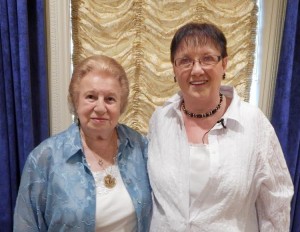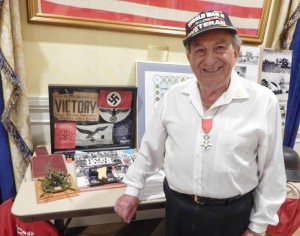
Several hundred members of The Villages South Jewish Chavurah, and others of other faiths, filled the Eisenhower Recreation Center theater Monday evening to hear Villager Ericka Yeger present slides and narrative from ‘My Mother’s Memoir from Auschwitz.’
The solemn evening began with the singing of the Star Spangled Banner; the Hatikvah (the National Anthem of Israel), and the Mourners’ Kaddish (prayer for the dead) in both Hebrew and English.
Twelve candles were lit in a ceremony honoring Jews and non-Jews who perished in the many Nazi prison camps all over Europe — in Germany, Austria, France, Poland, Hungary, Romania, and what is now Slovakia and the Czech Republic. “To honor the first, the last and the rest (who died), we light these candles,” Ericka Yeger intoned from the podium.
On hand to participate in the proceedings was concentration camp survivor, Miriam Apfel, accompanied by her daughter, Bracha; and World War II U.S. Army Staff Sgt. Irving Locker, 90, of the 116 AAA Gun Battalion Anti-aircraft Tank Artillery, who helped liberate the Gardelegen camp after the mass slaughter of 1,000 Jews there by immolation in a single day.
Monday was the 70th anniversary of the Gardelegen massacre, which took place on April 13, 1945.

Through a series of lucky occurrences — some might say miracles — Yeger’s mother, Shari (Sarah) Markowits (Nussbacher), who was born in 1923 in Transylvania and passed away in Israel in 2007, survived harrowing times at Auschwitz prison camp. Nussbacher taped her memoirs in Hebrew and Hungarian, which her daughter translated — accompanied by photographs and mementos.
Yeger outlined, step by grueling step, her Mother’s journey, which started in 1943, when she and her entire family were herded onto cattle cars with no windows or oxygen for the long railroad trip to Auschwitz. “From 1933 to 1945, the German Nazi party carried out the systematic killings of about 11 million people — including six million Jews and more than five million others — including clergy, the handicapped and mentally ill, homosexuals, spies and American and Allied troops, captured and held as prisoners of war ,” she related.
Yeger explained: How did the war start? How did Hitler come to power? What happened, and what can we do to prevent this from happening ever again? Members of the South Jewish Chavurah read poetry and asked the audience to remember the unborn dreams and the agony of the men, women and children who perished in the Holocaust. “We want this world to be saved from evil,” they said. “We recall the splendor and also the pain of the past. We remember Babi Yar — the killing place — when in Russia in September 1941, 100,000 Jews were killed in one week.”
Yeger explained Hitler came to power in 1923-45 when he promised the German people relief from economic distress: unemployment, starvation and poverty. She defined the Aryan Nation as Hitler’s goal to produce a pure German master race of tall, slim, blond, blue-eyed people — which was ironic, since Adolf Hitler himself did not fit that profile. She defined the Holocaust as the systematic, bureaucratic, State-sponsored persecution and murder of millions of Jews for no explainable reason. The word Holocaust has Greek origins, meaning sacrifice by fire.
Yeger defined genocide as the demoralizing, dehumanizing and extermination of people of certain ethnic and demographic characteristics — and lastly, she explained scapegoating as the practice of singling out any p erson or group for unmerciful negative treatment or blame — be it children, employees, peers, ethnic or religious groups or nationals of a specific country.
“It is unexplainable why Jews were targeted,” Yeger said sadly. “Jews were a minority in Europe who held jobs and worked hard like everyone else. They served in the army, and had both professional and menial jobs. The violence was overlooked by the police, as things progressed from bad to worse, and the Jews were forced to wear ‘Jude’ star badges on their clothing.”
She cited Kristal Nacht, November 8-20, 1938 when, all over Europe, people in Jewish ghettos were rounded up, terrorized and killed. Yeger was only eleven years old when she came to Israel. Her mother had been so traumatized by the horrors she experienced she never spoke about her imprisonment by the Nazis until Yeger was in college. In 1995, Ericka Yeger and her husband, Frank, received a package from her father containing the tapes of her mother’s memoirs.
The prisoners were strip searched, their heads were shaved, and they were forced to take part in medical experiments. Yeger’s mother was exempted from the experimentation because her appendix scar was deemed distasteful by Dr. Josef Mengele , a physician who designed the experiments. She and other prisoners survived on bread and water, plus pears and carrots they were able to smuggle during their forced walks to and from distant factories , where they provided forced labor. The Auschwitz gates still have the inscriptions in German today: Arbeit macht frei — work will make you free.
Yeger compared some of her mother’s photos with slides taken by family members who returned to the labor camp sites in 2002. She showed the work camps, the gas chambers and even the dirty little ‘cabin 21’ where her mother lived in a wooden bunk with only one blanket for several years.
The message, of course, is to pay attention to what is going on in your community, your state and your nation; to have zero tolerance for bullying , and suspicion of those who would offer free benefits in exchange for one’s loyalty and loss of freedoms. Be aware of what officials say and even more importantly, be aware of what they do — the actions they take. Be cognizant of their motives and goals — and be sure they are in the best interests of the citizenry. Evil can grow when wise people choose to look away and do nothing.
“At the end of the war, German Christians expressed their profound sorrow for what had happened and asked for forgiveness,” Yeger reported.
U.S. Army Staff Sergeant Irving Locker, a well known and loved Villages resident who looks and acts decades younger than his ninety years, displayed historic souvenirs of his military service during World War II, including Nazi insignia, shells, guns, daggers and a helmet. As the program ended, so did the stormy weather.
To contact The Villages South Jewish Chavurah, phone 352 633-0707 or e-mail: tvschavurah@gmail.com

